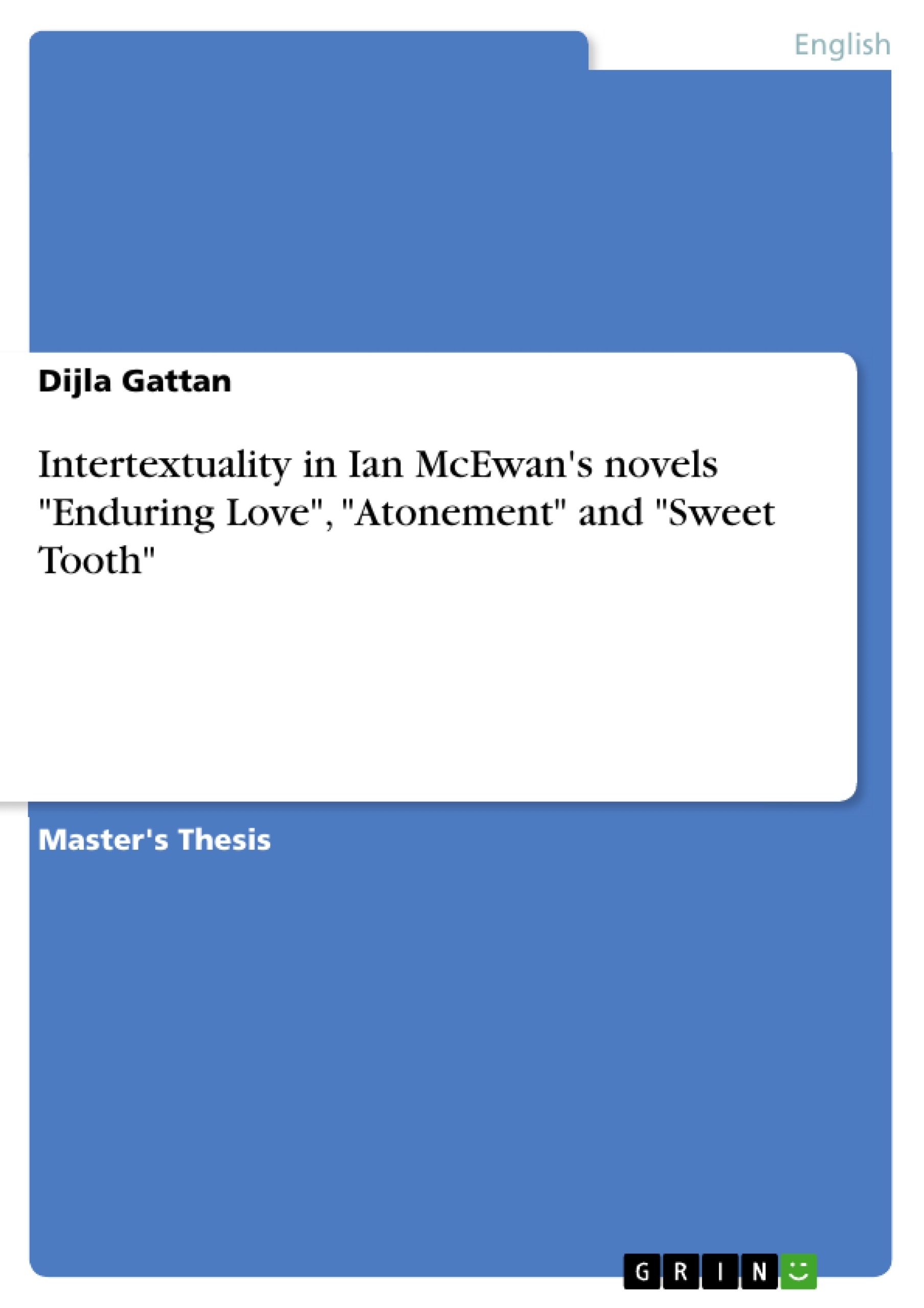
Intertextuality in Ian McEwan's novels "Enduring Love", "Atonement" and "Sweet Tooth"
Masterarbeit, 2016
169 Seiten
Leseprobe
Frequently asked questions about the Language Preview
What is the general topic of the language preview?
The language preview focuses on intertextuality in selected novels by Ian McEwan, specifically analyzing how McEwan utilizes this technique to develop themes, characters, and narration.
What does the language preview include?
The preview includes acknowledgements, an abstract, a table of contents, chapter summaries, and key words.
What is the structure of the thesis as indicated in the abstract?
The thesis is divided into an introduction, three chapters, and a conclusion. Chapter One introduces intertextuality theory, Chapter Two studies *Enduring Love*, and Chapter Three examines *Atonement*. Chapter Four deals with McEwan's *Sweet Tooth*. The conclusion summarizes the study's findings.
What is intertextuality according to Julia Kristeva?
According to Julia Kristeva, intertextuality refers to the shaping of a text's meanings by other texts, suggesting that there is no independent text but rather an "intertext," a tissue of inevitable references and quotations.
Which novels by Ian McEwan are analyzed in the language preview?
The language preview focuses on three specific novels: *Enduring Love*, *Atonement*, and *Sweet Tooth*.
What are some key themes and concepts explored in the preview?
Key themes include intertextuality, metafictionality, the controversy between human studies/literature and science, the role of the reader, and the impact of history on individual lives.
Who are some of the theorists mentioned concerning Intertextuality?
The document mentions Julia Kristeva, Mikhail Bakhtin, and Roland Barthes as important figures in the development of intertextuality theory.
What is Sweet Tooth about?
Sweet Tooth deals with the complexity resulting from the interconnectedness between intertextuality and metafictionality, and its genre as a spy novel.
What elements are discussed in McEwan's life and career overview?
The preview touches on McEwan's early life in military bases, his developing political consciousness, his family background, and the key characteristics of his fiction, such as feminism, the role of science and rationalism, moral perspectives, and the fragmentariness of his writing.
What are some of the influences on McEwan's Writing?
According to the preview information, McEwan's writing has influences from Romanticism, T.S. Eliot, and theories from critics such as Harold Bloom, along with a general interest in science, making the novels rich with intertextual references.
Details
- Titel
- Intertextuality in Ian McEwan's novels "Enduring Love", "Atonement" and "Sweet Tooth"
- Hochschule
- Universität Al-Qadisiyah
- Autor
- Dijla Gattan (Autor:in)
- Erscheinungsjahr
- 2016
- Seiten
- 169
- Katalognummer
- V367579
- ISBN (eBook)
- 9783668470484
- ISBN (Buch)
- 9783668470491
- Dateigröße
- 1665 KB
- Sprache
- Englisch
- Schlagworte
- intertextuality mcewan enduring love atonement sweet tooth
- Produktsicherheit
- GRIN Publishing GmbH
- Preis (Ebook)
- US$ 0,99
- Preis (Book)
- US$ 54,99
- Arbeit zitieren
- Dijla Gattan (Autor:in), 2016, Intertextuality in Ian McEwan's novels "Enduring Love", "Atonement" and "Sweet Tooth", München, Page::Imprint:: GRINVerlagOHG, https://www.diplomarbeiten24.de/document/367579
- Autor werden
- Ihre Optionen
- Vertriebskanäle
- Premium Services
- Autorenprofil
- Textarten und Formate
- Services für Verlage, Hochschulen, Unternehmen

- © GRIN Publishing GmbH.
- Alle Inhalte urheberrechtlich geschützt. Kopieren und verbreiten untersagt.
- info@grin.com
- AGB
- Open Publishing
Der GRIN Verlag hat sich seit 1998 auf die Veröffentlichung akademischer eBooks und Bücher spezialisiert. Der GRIN Verlag steht damit als erstes Unternehmen für User Generated Quality Content. Die Verlagsseiten GRIN.com, Hausarbeiten.de und Diplomarbeiten24 bieten für Hochschullehrer, Absolventen und Studenten die ideale Plattform, wissenschaftliche Texte wie Hausarbeiten, Referate, Bachelorarbeiten, Masterarbeiten, Diplomarbeiten, Dissertationen und wissenschaftliche Aufsätze einem breiten Publikum zu präsentieren.
Kostenfreie Veröffentlichung: Hausarbeit, Bachelorarbeit, Diplomarbeit, Dissertation, Masterarbeit, Interpretation oder Referat jetzt veröffentlichen!
- GRIN Verlag GmbH
-
- Nymphenburger Str. 86
- 80636
- Munich, Deutschland
- +49 89-550559-0
- +49 89-550559-10
- info@grin.com
-









